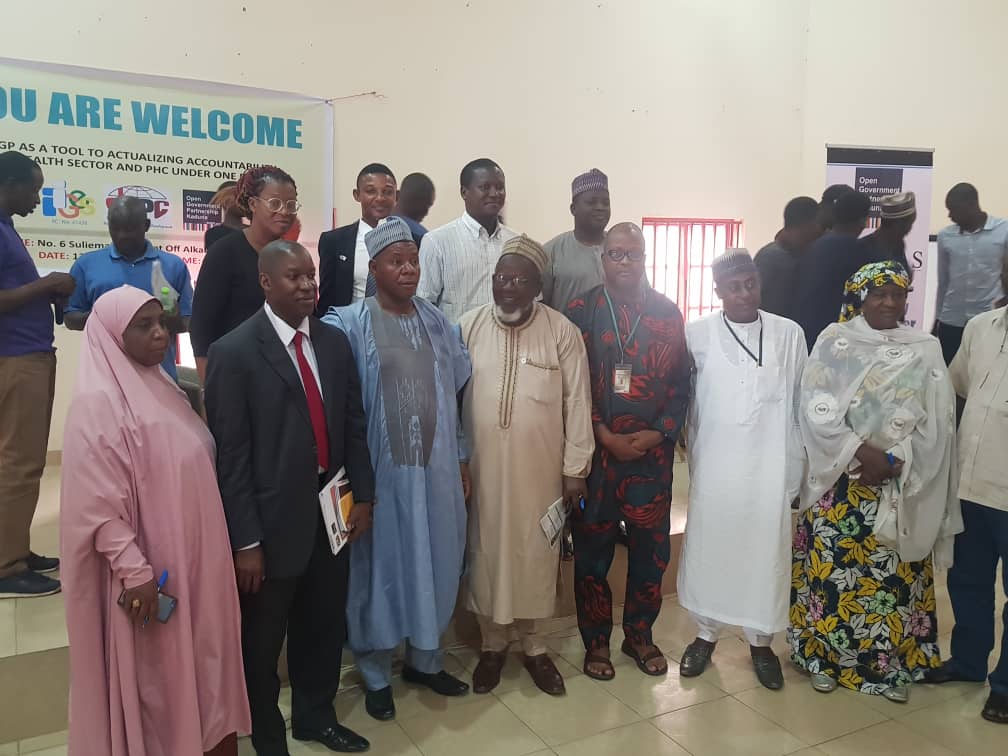PROMOTED: Leveraging OGP Principles to Attain Accountability in Kaduna’s Implementation of Primary Health Care Under One Roof model
As part of the OGP Kaduna Week 2019, the development Research Project Center (dRPC), last week, hosted members of the Kaduna State Open Government Partnership (OGP) community and stakeholders in the state’s Primary Health Care (PHC) sector to a one-day event themed: “OGP as a tool to actualizing accountability in health sector and Primary Health Care Under Roof”

The day-long event which deliberated on strategies for ensuring accountability in Kaduna`s implementation of Primary Health Care Under One Roof (PHCUOR) model, leveraging the existing OGP process in the state, was convened by the development Research Project Center (dRPC) under the Partnership for Advocacy in Child and Family Health at Scale (PACFaH@Scale) project. It had in attendance OGP stakeholders from Kaduna state and state OGP representatives from Kano and Niger as well as the state Primary Health Care (PHC) stakeholders and representatives of civil society organizations working on health and OGP in the state.
PACFaH@Scale also known as PAS is a five-year health and social accountability project funded by the Bill and Melinda Gates Foundation (BMGF) which advocates to the executives and legislatures at federal, states and LGA levels the need to fulfill their service and social compacts with the citizens, fulfill promises made and implement policies, laws and regulations that have positive health impacts on the people. More so, the project aims to strengthen the capacity of Nigerian Civil Society Organizations, (CSOs) at national and state levels to hold decision-makers (in the executive and legislature) accountable for health policies, financial commitments and bring down regulatory barriers related to child and family health.
The concept of Primary Health Care (PHC) which was adopted by the International Conference on Primary Health Care held in Alma-Ata, USSR in 1978, is considered an essential component of human development aimed at improving the economic, social and health wellbeing of the people –` in recognition of the fundamental human right of access to the highest attainable standard of healthcare by all. Achieving Universal Health Coverage (UHC) – which is one of the 13 targets of the Sustainable Development Goal 3: Health and wellbeing – in developing economies will remain a mirage, unless and until developing countries built resilient and efficient primary health care systems, capable of serving as first line of defence against all forms of public health threats.
Current standard of primary health care service delivery in Nigeria could at best be described as low, with millions of women and children dying every year, largely from conditions and complications that are manageable and preventable at the level of primary health care. Hence, the debilitating indices of maternal, newborn and child mortality in the country could best be addressed only by improving the quality of healthcare services available and accessible at primary health care level.
Nigeria`s ruined Primary Health Care system has long been a cog in the wheel of the quest towards achieving UHC in Africa’s most populous nation; it is riddled with many challenges including a fragmented structure, poor allocation of funds and resources, a general lack of accountability and the fact that many primary health care workers or rather Community Health Extension Workers (CHEWs) lack the requisite knowledge and skills to effectively treat common diseases prevalent among women and children. Thus, it was against this backdrop that the Nigerian government (in 2011) instituted a national policy called “Bringing Primary Health Care Under One Roof,” aimed at reducing the prevalent fragmentation in the delivery of PHC services and the integration of all PHC services under one authority.
PHCUOR is therefore aimed at strengthening the PHC system through the implementation of the principles of three ones: “one plan, one management, and one monitoring and evaluation system,” towards improving the overall performance of Nigeria’s PHC system including achieving universal coverage and improved quality of essential public health services at PHC level. The principle of three ones, which is in accordance with the provisions of the National Health Act of 2014, is built on the premise of Resolution 29 of the 54th National Council on Health held May 2011 at Abuja.
Health reform advocates like Hassan Ibrahim of the nonprofit Health Reform Foundation of Nigeria (HERFON) believe: “PHCUOR will help solve the problem of unclear roles and responsibilities of health workers resulting from multiple management of the primary health care system.”
Ibrahim, who was guest speaker at the dRPC-PAS event on the role of OGP in achieving accountability in Kaduna’s health sector through the instrumentality of the PHCUOR model, presented a paper titled: “PHCUOR and the journey so far in Kaduna state,” describing primary health care as a grass-root management approach to providing health care services to grassroot communities, based on their specific needs and without any financial, social or geographical barrier.
“More than 90% of the health needs of the people is contained and taken cared of at the PHC level. [Thus], primary health care is of the people by the people and for the people; it is the first level of contact with the country`s health system bringing health care as close as possible to the communities,” said Ibrahim.
While presenting findings on the progress of the implementation of PHCUOR in Kaduna state, Ibrahim noted that the operationalization of the PHCUOR model in Kaduna had improved significantly. He said the state had an overall score of 47 percent in the PHCUOR implementation scorecard conducted in 2015 by the National Primary Health Care Development Agency (NPHCDA) and subsequently scored an overall average of 80 per cent in the 2017 scorecard, based on all the 9 pillars of PHCUOR.
The 9 pillars of PHCOUR are governance and ownership; legislation; funding sources and structure; human resources; and minimum service package. Others are systems development; office setup; operational guidelines and repositioning.
“Before now, [in Kaduna state] PHC was controlled by many authorities – local government authorities, state ministry of health; some staff of the ministry of health were deployed to work at the PHC centres. So, the Kaduna state government signed the PHCUOR policy into law in September 2015 and Kaduna state scored about 47 percent at that time based on the implementation of the overall pillars of PHCUOR and over 80 percent in 2017,” Ibrahim told African Newspage.
He noted that the implementation of PHCUOR in the state – which is guided by the principles of “three ones”one management, one plan, and one monitoring and evaluation – had provided an opportunity for positive change in the state`s health sector which he said would be evident in improved health outcomes and efficient service delivery. “PHCUOR will greatly enhance service delivery because you will have smooth implementation of plans and flow of directives. The health care worker will be comfortable, his morale will be boosted and that will translate to a change in the working attitudes of the PHC workers, which in turn, will benefit patients and the community at large.”
While also presenting the PHCUOR Implementation Scorecard III conducted in June 2018 by the National Primary Health Care Development Agency (NPHCDA), which measured the progress made by Kaduna state in the implementation of the 9 pillars of PHCUOR, Niyi Ekishola of the national primary health care agency said Kaduna state scored 66 percent, placing it in 5th position nationwide. He noted that the state`s best performing pillars were Office Setup (100%) and Funding Sources and Structure (86%) and however, said Kaduna state didn’t perform well in Legislation and Minimum Service Package (MSP) with 38% and 53%, respectively.
Ekishola however, noted “a need to amend the state primary health care law to include the division of the roles and responsibilities of the governing board from that the management board. And also, develop regulations for the operationalization of the Kaduna State Primary Health Care Board (KDPHCB) and include more women and key stakeholders in the board.”
It would be recalled that in 2017, Kaduna state became the first subnational entity in Nigeria to sign up to the Open Government Partnership (OGP), which was immediately followed by the development of a State OGP Action Plan (SAP), the Kaduna State Action Plan (KAP) is focused on five commitment areas: open budget, open contracting, ease of doing business, access to information as well as citizen engagement and empowerment in governance.
To this end, the dRPC-PAS event was aimed at ensuring transparency and accountability in Kaduna`s implementation of PHCUOR model, in accordance with the principles of transparency and accountability enshrined in the Open Government Partnership process. dRPC-PAS believe the involvement and engagement of civil society organizations in the process will foster accountability and use of innovations in the implementation of the PHCUOR model towards improved service delivery in the state’s health sector.
“This is a stakeholders` forum where we invited key stakeholders in the state health sector under PHCUOR to inform them about the PHCUOR and then try to link up the PHCUOR to OGP principles in order to ensure accountability, transparency, and use of innovations to enhance the implementation of the PHCUOR model and improve service delivery in the state,” said Mustapha Jumare, co-chair of OGP Kaduna..
“As civil society organizations, we are working closely with the government of Kaduna state to ensure openness and transparency in the state ministry of health’s budgeting process. It is the first ministry in the state to open-up its budget process and so far, we’ve had interactions with the ministry regarding it`s performance particularly in relation to PHC and all other sectors under it including medical consumables and drug supply etc. So, what we are now doing is zeroing down on the issue of PHCUOR and linking it with, transparency, accountability and use of technology to improve service delivery,” Jumare added.
Stakeholders at the dRPC-PAS event held as part of the 2019 Kaduna OGP Week (which lasted between April 9 and April 13) believed leveraging the principles of the OGP process – as contained in the state’s commitment areas such as open budget, open contracting, access to information as well as citizen engagement – had the capacity to ensure accountability in the implementation of PHCOUR model, through active engagement of the civil society in Kaduna state.












